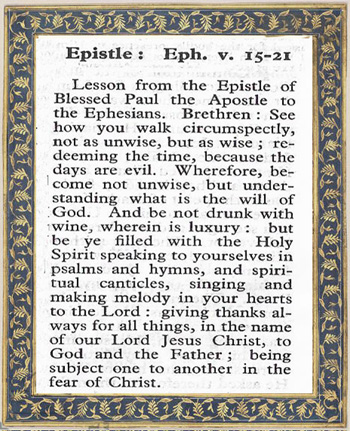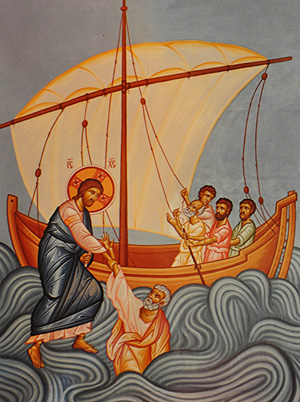Catholic Virtues
 |
 |
 |
 |
 |
 |
 |
Sermon for the 20th Sunday after Pentecost
Characteristics of a Man of Faith
קַיָּפָא (Kepha): This was the name that the Lord chose for the first Pontiff of His Church. However, in the time of Our Lord there was another Kephas (in the Greek version Κηφᾶς, Καῒάφας) exercising the position of High Priest. Do you remember who he was? Yes, precisely that High Priest who condemned Christ to death, and whose name in English was transliterated as Caiaphas. Caiaphas in Aramaic is also קַיָּפָא (Kepha).
 Knowing this, it is opportune for us to receive some instruction from this "coincidence." And one lesson can be this: Faith is sublime, but when perverted it can be very dangerous. It can be an instrument for the worst sins, those carried out with premeditation and treachery. It can be a tool for those who, based on apparent teachings of the Faith, make us move away from God rather than bring us closer to Him.
Knowing this, it is opportune for us to receive some instruction from this "coincidence." And one lesson can be this: Faith is sublime, but when perverted it can be very dangerous. It can be an instrument for the worst sins, those carried out with premeditation and treachery. It can be a tool for those who, based on apparent teachings of the Faith, make us move away from God rather than bring us closer to Him.
That is why we must be careful not to fall into the temptation of using the words of the Lord to try to justify our personal opinions that go directly against Him or, even worse, to dissever others from the spirit of religion as did Caiaphas and his minions who, using the letter of the Law as a pretext, came to crucify the very Author of the Law.
Faith certainly has a radical and definitive aspect. Our Lord compared it to a sword, when he said: "Do not think that I came to send peace upon earth: I came not to send peace, but the sword. For I came to set a man at variance against his father, and the daughter against her mother, and the daughter in law against her mother in law." (Mt 10:34-35)
In a good sense, faith divides those who believe from those who do not believe, this is – as the Preface of the Mass says – "truly meet and just, right and for our salvation." Faith is exclusive by nature. It excludes all errors. The problem is that the double edge of this sword can easily become double standards of morality. For this reason, the Church has developed a two-millennium Magisterium that teaches us about morality, instructs us on how to put our Faith into practice.
 The lesson of the Epistle of St. Paul (Eph 5:15-21) we hear today provides an example of this. Through it, the Church reminds us that we should seriously study what are the essential characteristics of the daily disposition of the man of faith: To be wise, sober, to be constantly in the presence of God, to be grateful to Him and always respectful of Him with holy fear. Those are some of the characteristics that we can read today in St. Paul´s lesson.
The lesson of the Epistle of St. Paul (Eph 5:15-21) we hear today provides an example of this. Through it, the Church reminds us that we should seriously study what are the essential characteristics of the daily disposition of the man of faith: To be wise, sober, to be constantly in the presence of God, to be grateful to Him and always respectful of Him with holy fear. Those are some of the characteristics that we can read today in St. Paul´s lesson.
Now, while there is a true and sincere faith, and another that is false and corrupt, there is also one that is lukewarm and constantly asking for signs. This is the faith that the Lord encountered almost from the beginning of His preaching and works of miracles. The first miracle of Christ was in favor of a middle-class marriage; the second, the one we hear today, in favor of an officer of the King; the third in favor of St. Peter - someone might even say that it was against St. Peter, because He healed his mother in law. After these three miracles, Our Lord made many others among poor people.
In this case, after reproaching the "officer of the King" with the phrase, "Unless you see signs and wonders, you do not believe," Christ did not even bother to visit the dying young man. He only uttered the words, "Go your way, your son lives," and that was it. He was really tired of the lukewarm people asking for signs and of the Pharisees putting Him to test in attempts to make Him fall.
Several times in Scriptures we find Our Lord referring to this lukewarm faith directing Himself not just to the people or to the Pharisees, but also to the Apostles. He called St. Peter "Man of little faith." (Mt 14:31) St. Peter, however, after he was confirmed in the faith, was the one who He chose to confirm his brothers in the faith.
 This episode tells us two things:
This episode tells us two things:
May our faith never become lukewarm by routine, but may we always strive to contemplate the presence of God in every small detail of our daily work.


Sycophant Jews pictured around an apathetic Caiaphas in The House of Caiaphas by Doré - 1899
That is why we must be careful not to fall into the temptation of using the words of the Lord to try to justify our personal opinions that go directly against Him or, even worse, to dissever others from the spirit of religion as did Caiaphas and his minions who, using the letter of the Law as a pretext, came to crucify the very Author of the Law.
Faith certainly has a radical and definitive aspect. Our Lord compared it to a sword, when he said: "Do not think that I came to send peace upon earth: I came not to send peace, but the sword. For I came to set a man at variance against his father, and the daughter against her mother, and the daughter in law against her mother in law." (Mt 10:34-35)
In a good sense, faith divides those who believe from those who do not believe, this is – as the Preface of the Mass says – "truly meet and just, right and for our salvation." Faith is exclusive by nature. It excludes all errors. The problem is that the double edge of this sword can easily become double standards of morality. For this reason, the Church has developed a two-millennium Magisterium that teaches us about morality, instructs us on how to put our Faith into practice.

Now, while there is a true and sincere faith, and another that is false and corrupt, there is also one that is lukewarm and constantly asking for signs. This is the faith that the Lord encountered almost from the beginning of His preaching and works of miracles. The first miracle of Christ was in favor of a middle-class marriage; the second, the one we hear today, in favor of an officer of the King; the third in favor of St. Peter - someone might even say that it was against St. Peter, because He healed his mother in law. After these three miracles, Our Lord made many others among poor people.
In this case, after reproaching the "officer of the King" with the phrase, "Unless you see signs and wonders, you do not believe," Christ did not even bother to visit the dying young man. He only uttered the words, "Go your way, your son lives," and that was it. He was really tired of the lukewarm people asking for signs and of the Pharisees putting Him to test in attempts to make Him fall.
Several times in Scriptures we find Our Lord referring to this lukewarm faith directing Himself not just to the people or to the Pharisees, but also to the Apostles. He called St. Peter "Man of little faith." (Mt 14:31) St. Peter, however, after he was confirmed in the faith, was the one who He chose to confirm his brothers in the faith.

Even when we fall, Christ wants to raise us up
- We need help from Our Lord to maintain our faith. Our Lord knows this. For this reason, perseverance is crucial. We should never despair as Judas did, but rather keep rising and fighting day by day against our selfish and self-serving bad desires.
- Although Our Lord does not like the slowness of the response of lukewarm people, He never refuses to help them. He certainly could do so. He passed through some cities without making any miracle. He did not speak to certain men; others He beat with a whip. But God saves those who seek to be saved, even if they do so sluggishly and sometimes sink into the sea, like St. Peter.
May our faith never become lukewarm by routine, but may we always strive to contemplate the presence of God in every small detail of our daily work.

Posted October 23, 2017














